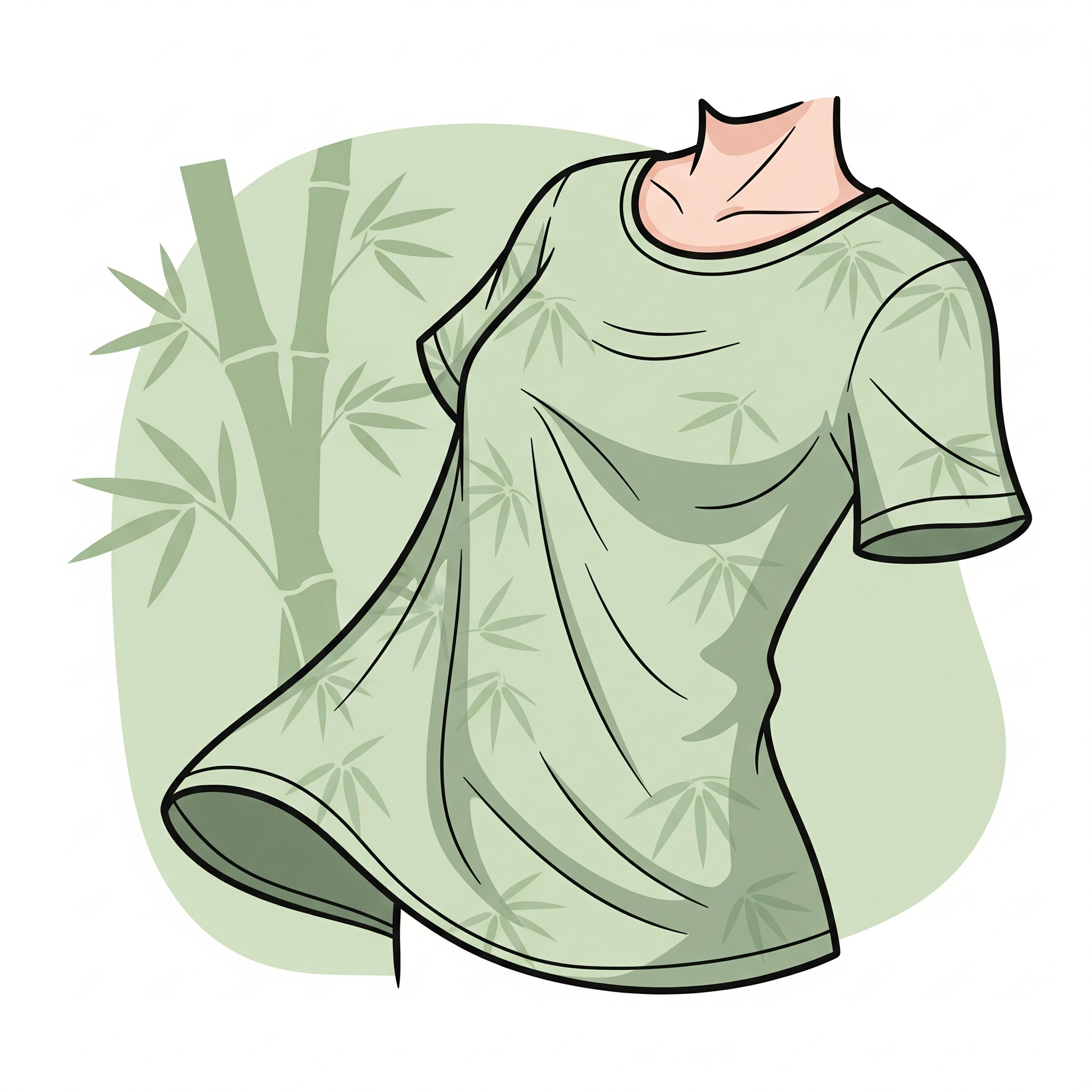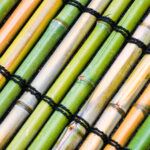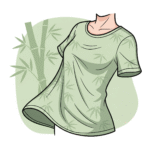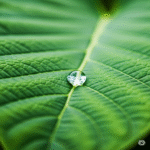Hey everyone! Have you ever thought about what your favorite T-shirt is made of? Most likely, it’s cotton. Cotton T-shirts are super popular, comfy, and easy to find. But there’s a new kid on the block that’s gaining popularity: bamboo!
Bamboo T-shirts are showing up more and more, and people are saying they’re amazing for both your skin and our planet. So, what’s the deal? Is bamboo really better than cotton? Let’s dive in and find out which fabric comes out on top in the ultimate T-shirt showdown!
What’s the Big Deal About What My T-Shirt Is Made Of?
You might be thinking, “It’s just a T-shirt! Why does it matter?” Well, it matters for a couple of important reasons:
- For You (Your Skin!): The fabric your clothes are made from touches your skin all day long. Some fabrics can be super soft and gentle, while others might feel a bit rough or even irritate sensitive skin. Plus, how a fabric handles sweat and keeps you cool (or warm) makes a big difference in how comfortable you feel.
- For the Planet (Our Home!): Every product we use, including our clothes, has a story about how it’s made, what resources it uses, and what happens to it when we’re done with it. Some materials are much “greener” than others, meaning they’re better for the environment. Choosing eco-friendly clothes helps protect our planet for everyone.
So, let’s meet our two contenders: Cotton and Bamboo!
Cotton T-Shirts: The Old Favorite
Cotton has been around forever. Think about your favorite comfy jeans, soft bedsheets, or that classic white T-shirt – chances are, they’re cotton!
How Cotton is Made (Simplified):
Cotton comes from the cotton plant. Imagine a fluffy white cloud growing on a plant – that’s a cotton boll! Once the bolls are picked (either by hand or by machines), the fluffy cotton fibers are separated from the seeds, cleaned, and then spun into yarn. This yarn is then woven or knitted into fabric that becomes your clothes.
Good Things About Cotton T-Shirts:
- Super Common & Affordable: Cotton T-shirts are everywhere! You can find them in almost any store, and they’re usually pretty budget-friendly.
- Soft & Breathable: Cotton feels nice against the skin, and it lets air pass through easily, which helps keep you cool.
- Strong & Durable: Cotton fabric is generally tough and can last a long time if you take care of it.
- Easy to Dye: Cotton takes color really well, which is why you see cotton T-shirts in every shade imaginable.
Not-So-Good Things About Cotton T-Shirts (Especially “Conventional” Cotton):
- Thirsty Plant: Cotton plants need a LOT of water to grow. In some places, this can put a big strain on local water supplies.
- Pesticides & Chemicals: Growing conventional cotton often involves using a lot of pesticides (chemicals to kill bugs) and fertilizers (chemicals to help plants grow). These chemicals can be bad for the environment (polluting water and soil) and for the health of farm workers.
- Land Use: Growing so much cotton takes up a lot of land that could be used for other crops or natural habitats.
- Wrinkles Easily: Ever notice how your cotton T-shirt gets wrinkly quickly after you wear it or take it out of the dryer?
- Slow Drying: Cotton can soak up a lot of sweat, but it also takes a while to dry, which can sometimes make you feel damp.
What about Organic Cotton?
You might have heard of “organic cotton.” This is a better choice because it’s grown without those harmful pesticides and synthetic fertilizers. It still uses water, but it’s a step in the right direction for the environment. When you see “organic cotton,” know it’s a more eco-friendly option!
Bamboo T-Shirts: The Eco-Friendly Challenger
Now, let’s talk about bamboo! When we talk about bamboo fabric for T-shirts, we’re usually talking about “bamboo rayon” or “bamboo viscose.” This isn’t just chopping down bamboo and weaving it; it’s a bit more of a process.
How Bamboo Fabric is Made (Simplified):
Bamboo fabric is made from bamboo pulp. The bamboo plant is harvested, then crushed and treated with certain chemicals to break it down into a pulp. This pulp is then pushed through tiny holes to create fibers, which are then spun into yarn and woven into fabric. There are also newer, more eco-friendly ways to make bamboo fabric (like “lyocell” or “closed-loop” processes), which use fewer harsh chemicals and recycle the water.
Good Things About Bamboo T-Shirts:
- Super Soft & Silky: This is one of the biggest reasons people love bamboo! It feels incredibly smooth and soft against your skin, often softer than cotton.
- Breathable & Temperature Regulating: Bamboo fabric is excellent at letting your skin breathe. It can also help keep you cooler in warm weather and warmer in cool weather, making it great for different seasons.
- Moisture-Wicking: This means it pulls sweat away from your skin, helping it evaporate faster. This keeps you feeling drier and more comfortable, especially if you’re active.
- Hypoallergenic (Good for Sensitive Skin!): Bamboo is naturally gentle and often recommended for people with sensitive skin or allergies because it’s less likely to cause irritation.
- Antibacterial & Odor Resistant: Bamboo has natural properties that can resist bacteria, which means your bamboo T-shirt might stay fresher for longer and be less likely to develop odors!
- Eco-Friendly (The Plant Itself!):
- Fast Growing: Bamboo is one of the fastest-growing plants on Earth. It can grow incredibly quickly, sometimes several feet in a single day!
- Needs Little Water: Unlike cotton, bamboo requires very little water to grow, often just rainwater.
- No Pesticides: Bamboo grows so quickly and is naturally resistant to pests, so it rarely needs pesticides or fertilizers to thrive.
- Self-Regenerating: Once harvested, bamboo plants can regrow from their existing roots, meaning you don’t have to replant them every time. This helps prevent soil erosion.
- Absorbs CO2: Bamboo plants are really good at absorbing carbon dioxide (a greenhouse gas that contributes to climate change) from the atmosphere and producing oxygen.
Not-So-Good Things About Bamboo T-Shirts:
- Manufacturing Process (The Catch!): While the bamboo plant itself is super eco-friendly, the traditional way of turning it into fabric (rayon/viscose) uses chemicals. These chemicals, if not handled properly, can be harmful to workers and the environment. This is the biggest “but” when it comes to bamboo’s eco-friendliness.
- More Expensive: Bamboo T-shirts are often more expensive than conventional cotton T-shirts because the manufacturing process can be more involved.
- Durability Can Vary: Some bamboo fabrics might be less durable than high-quality cotton, especially if not cared for properly.
- Prone to Pilling: Over time and with lots of washes, some bamboo fabrics can develop tiny little balls of fiber on the surface called “pills.”
Important Note on Bamboo Processing: “Closed-Loop” or Lyocell Process
As mentioned, the chemical process for making bamboo fabric is the main concern. However, some companies use a more advanced and environmentally friendly method called the “closed-loop” or “lyocell” process (sometimes called Bamboo Lyocell). This method recycles almost all of the chemicals and water used, making it much safer for the environment. When you’re shopping, look for “Bamboo Lyocell” if you want the most eco-friendly bamboo fabric!
Bamboo vs. Cotton: The Face-Off!
Let’s put them head-to-head on the key things you care about:
| Feature | Conventional Cotton T-Shirts | Bamboo T-Shirts (Viscose/Rayon) | Bamboo T-Shirts (Lyocell) |
| Feel on Skin | Soft, breathable, common | Super silky soft, very breathable | Super silky soft, very breathable |
| Comfort | Good, but can feel damp when sweaty | Excellent – moisture-wicking, temperature regulating | Excellent – moisture-wicking, temperature regulating |
| For Sensitive Skin | Generally okay, but can sometimes irritate | Excellent – naturally hypoallergenic | Excellent – naturally hypoallergenic |
| Odor Resistance | Can hold odors over time | Good – naturally antibacterial | Excellent – naturally antibacterial |
| Water Use | High (thirsty plant) | Low (bamboo plant needs little water) | Low (bamboo plant needs little water) |
| Pesticides | High (for conventional cotton) | None (bamboo grows without them) | None (bamboo grows without them) |
| Chemical Use (Manufacturing) | Moderate to low (depending on dyes/finishes) | High (for traditional rayon/viscose) – This is the main drawback | Very Low (closed-loop system, recycles chemicals) – Best choice! |
| CO2 Absorption | Moderate | High (bamboo plants are carbon sinks) | High (bamboo plants are carbon sinks) |
| Cost | Usually Lower | Often Higher | Highest (due to advanced processing) |
| Availability | Very high | Growing, but less common than cotton | Least common, but growing |
So, Which is Better? The Verdict!
After looking at all the facts, here’s the honest truth:
- For Your Skin: Bamboo T-shirts (especially any kind of bamboo rayon/viscose/lyocell) are generally better for your skin. They are incredibly soft, breathable, moisture-wicking, and often hypoallergenic. If you have sensitive skin or sweat a lot, bamboo is a fantastic choice for comfort.
- For the Environment: This is where it gets a little tricky!
- The Bamboo Plant itself is amazing for the environment. It grows fast, needs little water, no pesticides, and absorbs a lot of CO2.
- However, the process of turning bamboo into fabric traditionally uses chemicals. This means that not all “bamboo” fabrics are created equal environmentally.
The Best Choice for the Environment is Bamboo Lyocell. If you can find T-shirts made from “Bamboo Lyocell” or fabric that uses a “closed-loop” process, that’s your gold medal winner! This type of bamboo fabric combines the awesome eco-benefits of the plant with a much cleaner manufacturing process.
If Bamboo Lyocell isn’t available or too expensive:
- Organic Cotton is a great runner-up. It avoids the harmful pesticides of conventional cotton, making it a much better choice.
- Traditional Bamboo Viscose/Rayon is still good for your skin, and the plant itself is eco-friendly. Just be aware of the chemical process if environmental impact is your top concern.
Conventional Cotton is generally the least environmentally friendly option due to its high water and pesticide use.
What Can You Do When Shopping for T-Shirts?
Now that you’re an expert, here are some tips for your next T-shirt shopping trip:
- Read the Label: Always check the fabric content! It will tell you if it’s 100% cotton, bamboo, a blend, or something else.
- Look for Certifications:
- For cotton, look for “Organic Cotton” or certifications like GOTS (Global Organic Textile Standard).
- For bamboo, look for “Bamboo Lyocell” or brands that explain their “closed-loop” manufacturing process.
- Certifications like OEKO-TEX Standard 100 mean the fabric is free from harmful chemicals, which is good for your skin and the environment.
- Consider Your Needs:
- Sensitive skin or want ultimate softness? Go for bamboo.
- On a budget or need something super common? Regular cotton is fine, but try for organic if you can.
- Active and sweat a lot? Bamboo’s moisture-wicking properties will be a big win.
- Buy Less, Choose Well, Make it Last: No matter what fabric you choose, the most eco-friendly T-shirt is often the one you already own! Take good care of your clothes so they last longer, and only buy what you truly need.
Wrapping It Up
Both bamboo and cotton have their pros and cons. While cotton is a classic for a reason, bamboo really shines when it comes to comfort for your skin and many environmental benefits of the plant itself. The key is to be a smart shopper and look for responsibly made fabrics, especially “Bamboo Lyocell” or “Organic Cotton.”
By making informed choices about the clothes we wear, we can all contribute to a healthier planet and feel great in our T-shirts too! Thanks for learning with me, and happy T-shirt choosing!











